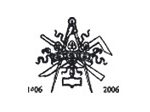Dario Del Bufalo
Born in Rome, Dario Del Bufalo graduated in Architecture with full marks and honours at the University of Rome La Sapienza in 1987, under the guidance of Bruno Zevi. He was a student of Prof. Raniero Gnoli (Marmora Romana, 1971) for the study of coloured marbles and stones from Roman quarries. With Prof. Gnoli he has carried out many excavation and surveys for the study of ancient marbles and Roman quarries in all the countries of classical tradition of the Mediterranean.
He was among the curators of various exhibitions and events such as the XLII Venice Biennale, Art and Science section (1986), at the Corderie under the direction of Prof. M. Calvesi and the celebrated exhibition on ancient marbles at the Markets of Trajan in Rome (2002), titled The coloured marbles of imperial Rome. He has taught for a decade in the Faculty of Cultural Heritage at the University of Lecce (1998-2007) a course on History of architectural techniques and ancient materials, publishing the volume Ancient marbles and semi-precious stones (Congedo Editore, Galatina 2000).
He was Head of the Department of the Under-Secretary of State Prof. Vittorio Sgarbi at the Ministry of Cultural Heritage and Activities of Italy (2001-2002). He restored the Castle of Cecchignola in Rome and the ancient rooms of the residence of Popes Paul V and Leo XII (2004-2008). He directed with Folco Quilici the movie The Marble Empire (Istituto Luce, Rome 2004), which won the International Festival of Archaeological Cinema.
Among his latest publications: Vasa Murrina (L’Erma di Bretschneider, Rome 2016), Porphyry (Allemandi Editore, Turin 2013), Marmorari Magistri Romani, (L’Erma di Bretschneider, Rome 2010); Studies of Glyptics, (L’Erma di Bretschneider, Rome 2009); Illustrated Catalogo f Glyptics from Fondazione Santarelli (L’Erma di Bretschneider, Rome 2009); Rome’s Università dei Marmorari (L’Erma di Bretschneider, Rome 2007), Coloured Marbles (Motta Editore, Milan 2003).
Dario Del Bufalo was President of Rome’s Università dei Marmorari when the organisation celebrated its 600 years since its foundation; this was in 2006 and it was followed by a series of studies, conferences and publications, curated by a special National Committee of the Italian Ministry of Cultural Heritage and Activities.
